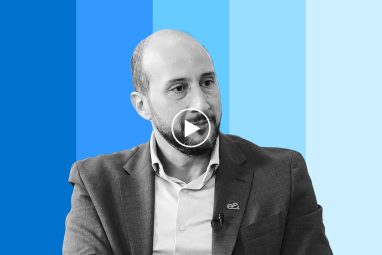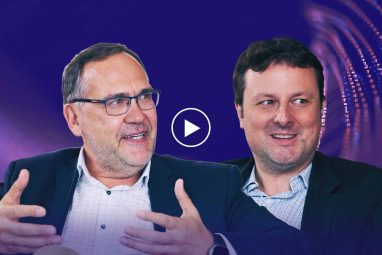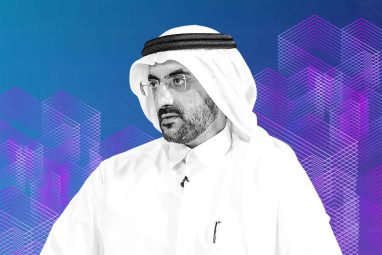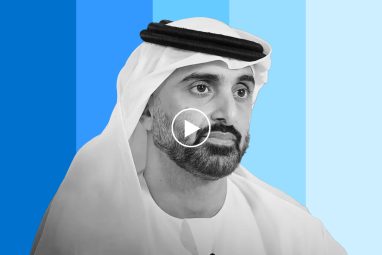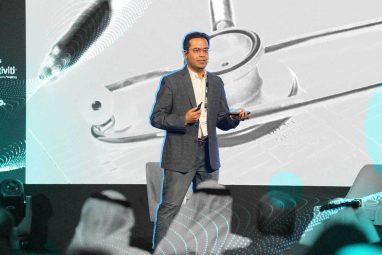Topics
What to Read Next
- Saudi Arabia Appoints New Investment Minister
- OpenAI Debuts First AI Model Optimized for Cerebras Chips, Reducing Nvidia Reliance
- OpenAI Retires GPT-4o as It Consolidates ChatGPT Models
- Spotify Developers Haven’t Written a ‘Single Line of Code Since December’ 2025
- UAE Unveils ‘Organ on Chip’ Tech to Revolutionize Drug Testing
- Microsoft Moves Toward AI Self-Sufficiency Amid Evolving OpenAI Ties
Akram Awad, Managing Director & Partner and Global Lead for Smart Cities at BCG, and Noor Sweid, Founder and Managing Partner at Global Ventures, discuss the region’s preparedness to harness the transformative potential of AI.
The Middle East is rapidly emerging as a key player in the global artifical intelligence (AI) landscape, leveraging its unique strengths to drive innovation, economic growth, and societal transformation in an era where artificial intelligence is reshaping industries worldwide.
But how ready is the region to capitalize on AI’s vast potential, and what steps must be taken to overcome the hurdles in talent, investment, and regulation?
“We see a significant trend in the Middle East when it comes to actually both managers, leaders, and frontline workers using AI,” says Akram Awad, Managing Director & Partner and Global Lead for Smart Cities at BCG.
Noor Sweid, Founder and Managing Partner at Global Ventures, adds, “Talent can build companies, but if those companies struggle to generate revenue, they won’t succeed.”
In the second episode of More than Meets the AI—titled Is the Middle East AI-Ready?—Akram and Noor explore the region’s preparedness for AI, examining key factors such as talent development, investment trends, emerging use cases, and regulation. They delve into the critical steps required to unlock AI’s full potential and discuss how the Middle East can position itself as a leader in the global AI ecosystem.
Transcript
Rachel Dawson: In our first episode, the experts agreed that there was no lack of ambition among nations when it comes to AI. However, there is a broader challenge in terms of human capital. I would like to start with Akram. If you could tell us, in terms of developing AI skills at a national level, where does the region stand? And do you think the Middle East is performing to the level it should be in terms of the AI appetite that exists.
Akram Awad: First, let’s go back to the point: why are we even talking about talent and its important? There is no doubt that there is a huge, global gap when it comes to AI talents. We’re talking about a nearly 85 million shortage in AI talents.
And if nations do not react to that, they would always be on the receptive and the consumer sides. There is another element, which is why nations need to develop their own AI talents in order to get some sense of AI sovereignty to ensure that they have the talents that would allow them to tailor AI solutions and technologies to the actual needs of the nations.
Now, how the region is doing, I think there are two parts to this question. The overall signals are promising. We are seeing that the Middle East is doing quite well when it comes to the overall understanding and the reception of AI. In a recent survey that we conducted in BCG, which was published recently, we found the Middle East coming around third globally as a region when it comes to the positiveness and the confidence in AI.
And this is really a sign of a fair understanding of what AI can bring to the table. It’s among the least when it comes to the levels of anxiety again, another good sign. In terms of adoption and usage also, we see a significant trend in the Middle East when it comes to actually both managers, leaders, and frontline workers using AI.
Now, taking a step back and looking into the bigger picture. Is there more that can be done? Yes, absolutely. The competition is going to continue, and it’s very important for the Middle East to position itself as a hub rather than a consumer of AI. When we look into the ratio, for example, of data scientists per million capita in the Middle East, it still remains around 100 data scientists per million capita compared to some leading nations already getting into 600 to 700.
So, there is still a significant gap to fill. The attractiveness of the nations is improving. In fact, a recent survey that we conducted resulted in both Dubai and Abu Dhabi being among the top five cities in terms of attractiveness to talents globally.
So, the capabilities are there. The positioning of the region is there. It’s a question now of building on that and really filling the gap of the talent.
Rachel Dawson: Noor, what do you look for in AI entrepreneurs in the Middle East? Are there any attributes that you’re looking for? And what do you feel stands out among them?
Noor Sweid: Well, first, thank you for having me. It’s great to be here today and to be part of this conversation. When we look for founders, it’s AI founders or otherwise. It’s always about founders that are on a mission to solve a very large problem. So, an AI founder would be no different if someone’s coming in and saying, I’m going to use AI to build a better solution for this problem that I’ve identified. That’s wonderful. The question is not what AI are you building, but rather how are you using AI? And even in the Gulf, MIT did a study at the MIT Review, back in 2019, where they found that 82 percent of large companies in this part of the world already used AI. That was five years ago, before it was hype, before Gen AI was there, so AI is not something new.
So, when we take a look at AI founders, it’s not really about the AI founder, it’s about the founder, the problem, the solution that they have, the company they’re building, how resilient they are, why they’re so passionate about building this company and solving this problem, and ultimately, how are they going to use AI, because the companies that don’t use AI will be disadvantaged.
So, when we take a look at our portfolio now, 60 percent of our portfolio is either AI-led or/and AI-enabled. And both of those are very interesting ways to think about it. Because these are companies, when we invested, this AI hype hadn’t happened. But when we came back to them last year and said, Guys, can you take a look?
Have you implemented? Have you changed? And some of them have changed. So, for example, AlTibbi, which started as a WebMD for the region, so lots of medical content online, and then became telemedicine, so you could reach a doctor, has now built the first LLM in Arabic for healthcare. That’s huge. That’s become an AI-led company.
Others have always embedded AI, and are now just accelerating how much they are using it to enable their progress and development. But the founder, at the end of the day, is the founder. And we take a look at all founders the same, the passion, the drive, the relevance, and how much they can bring to the table in solving the problem.
Rachel Dawson: Have you seen or identified any investment trends in the region that are probably attracting more AI interest, and what factors do you look for when you’re looking specifically at startups that are involved in AI? You did touch on it previously, but is there anything specific to just the whole hype of AI when it comes to digging out that talent from the region?
Noor Sweid: We have to be very careful when we value companies because just like everything five years ago was blockchain and you had this blockchain hype, and blockchain demanded a premium on a multiple basis, right?
But from the beginning, our perspective was everything is going to be blockchain-enabled if it hasn’t yet been built on Web 2. And in this part of the world, you know, much of it has not yet been built on Web 2. So, we start to see this leapfrogging into Web 3 and blockchain. And now you can say that if it makes sense as a use case, every company should have some level of smart contract or blockchain or decentralized finance (DeFi).
Look where DeFi is compared to five years ago, right? But where are the multiples today for these companies? Back to normal. Right? So, we’ve come down from that multiple expansion because of the hype and the intense amount of capital going into that one vertical. And I think AI is in a similar place, where AI, the companies kind of, you know, have a large multiple expansion at this point of the time, there’s a lot of capital going into that sector, and therefore valuations are pretty low.
You know, probably overhyped, but when we look forward to three to four years, we’re going to see everything is AI-enabled. Every company uses AI or it’s disadvantaged. The question is, how do you apply the AI to provide a better solution that is more accurate, that is faster and more intuitive and gives you more insights for your customer?
And those AI multiples and AI valuations will suddenly be embedded in the value of the company and no longer demand a premium like they do today. So, when we think about investing, we always have to be conscious of, in three years, this premium on multiples will cease to exist. How is AI actually helping this company provide a better solution?
And what is the value of that today without the AI premium?
Rachel Dawson: Akram, if I can take a leaf from what Noor just shared, looking at the broader investment landscape, what has been the nature and level of AI funding in the region and how does this compare on a global scale? And what is the role that you see governments play to harbor an increased appetite for investment?
Akram Awad: I need to be careful answering this one sitting next to the investment guru, but see, in general, the investment in AI globally still remains concentrated within specific hubs. I think when we looked into the figures last time, around 60 percent of that is still floating into the US, for example, and everyone else basically captured the rest of the market.
When it comes to AI startup funding in the Middle East, when we compare the results, for example, in places like UAE and KSA, the figures remain around, I think, 0.1 percent of the overall GDP as a comparison. But if you look into other more mature markets such as Singapore, for example, or the UK, the number is almost 10 times that figure.
So, there is certainly room to go when it comes to basically how much money we actually get into that. I don’t think we are short of smart money in the region. It’s really more about having the right understanding of these opportunities and building the right funnel. The other aspect of that, if we look beyond just the traditional VC funding, there are additional funding elements that I think are less mature, for example, debt vehicles.
When we looked into that, we realized that actually a lot of the debt vehicles that are available in the market are mainly tailored for major companies, not for SMEs, and a lot of the AIs are still in that early phase. And they are not basically tailored specifically for AI companies because a lot of these vehicles are tailored toward heavy capital investments.
But what you need as an AI startup is really to be able to take a loan to fund, for example, an AI pilot, before you start basically building your financial muscles. So, this is also specifically an area where, for example, governments can start filling some of these gaps. But we also need to be careful with where the government plays because today, I think some of the markets at least are leaning too much toward government funded AI ecosystem where we need to gradually build that confidence that the government focuses on filling the gaps and sharing the risk while basically continuously aiming toward if FDI and private sector investment in the market.
Rachel Dawson: Are there any emerging use cases in AI adoption that you feel hold promise and can justify a shift towards Gen AI in a bigger way within the region? Are there any use cases that you’ve seen and personally feel hold promise?
Noor Sweid: I mean, we have one company in the portfolio, for example, that has always used some components of machine learning and AI in a context that works on managing manpower outside the office. For example, if you’re the police force or a large port provider and you have thousands of employees always working out there, the question is, how do you manage them?
Sometimes, it can be on WhatsApp or different platforms for communication, but how do you control their efficiency? How do you see what they’re good at, what they’re not good at? Then how do you change next week’s schedule to allow people to do the things they’re good at and capture efficiency across your manpower?
So this company we invested in about five years ago, and they’ve always used AI, helps companies capture a 36% increase in efficiency across the board. Now they’re in the U.S. market, they’re in Europe. They’ve scaled globally from the region, but they are effectively an AI company.
When you think about all deskless workers, if you can bring them into a space where they’re working on tasks they’re actually good at and more efficient at, while removing the ones they don’t enjoy or aren’t efficient at, you can optimize for their happiness and well-being too. That’s really what they’re working on—capturing efficiency, well-being, and how people are working, using AI.
Akram Awad: If I could take maybe a different spin to this, I think we’re just about to get into the proper adoption at scale of Gen AI. I think everyone in the past couple of years was still in the exploration phase—figuring out what can be done with ChatGPT and the like. Only now are people starting to look into more tailored solutions.
For example, one of the products we’re looking into right now, and a lot of clients are asking for, is knowledge management. How do I take all the content scattered around the organization and make it accessible? It’s very simple, but it tells you the potential lies not in one specific use case but in tailoring the technology to address specific problems.
In the Middle East specifically, given the multilingual nature of the population, there’s a huge opportunity in customer service—filling communication gaps to provide consistent service across a diverse population, whether they speak Arabic, English, or other languages.
Energy will also continue to be a prominent topic—not necessarily Gen AI itself, but automation and autonomous drilling, for instance. Healthcare is another sector with significant potential, especially for addressing regional issues such as diabetes.
But as I said, it’s not just about one use case. Now, we’re tailoring no-code or low-code technologies to meet the specific needs of organizations, which brings AI adoption into context at scale.
Rachel Dawson: Akram, how can countries in the region strike a balance between AI innovation while remaining responsible and ensuring that development isn’t hindered?
Akram Awad: That’s always a difficult balance to strike. We certainly need to ensure people abide by the rules and ethics, especially in an environment where the population is quite excited about AI. If you look at the confidence level and the limited anxiety about AI here, it’s because we have a tech-savvy population that actively wants to use technology.
This brings an element of self-discipline, but collaboration between the private sector, the producers of technology, and the public sector is crucial. We’ve seen a good success story in how this can work in the fintech industry. Through regulatory sandboxing, we were able to experiment and understand the consequences of regulations before introducing restrictions that could hinder innovation.
Europe’s AI Act and their scaling of regulatory sandboxing concepts are examples we can borrow. These can be adapted to the Middle East to ensure public and private sectors collaborate on a more gradual implementation of AI regulations.
Rachel Dawson: What are some critical steps that Middle Eastern countries can take to stay ahead in AI, beyond supporting talent and fostering innovation? What do you feel is the need of the hour?
Noor Sweid: For me, it’s not just about AI. I’d love to see more governments and large corporations engage with and use local companies. Talent can build companies, but if those companies struggle to generate revenue, they won’t succeed.
Sometimes, the software or AI developed in the region is just as good, if not better, than global offerings. We have proof of this because many of our companies, including cybersecurity ones, earn more revenue from the U.S. than from the region.
However, regional governments and corporates often take too long to evaluate whether local products are as good or better than international options, defaulting to the latter. This isn’t always true, as we’ve seen. Supporting local companies more actively would lead to significant growth and give the region a competitive edge.
Akram Awad: My perspective is that the region, particularly countries like UAE and KSA, can play a major role in balancing global AI efforts amidst the polarization between the U.S. and China. It’s not about being number three but about uniting the world around common goals to drive AI for humanity’s benefit.
Both UAE and KSA have done a remarkable job so far, being represented in the AI advisory body led by the United Nations. KSA’s establishment of the ICARE Center under UNESCO and participation in global AI safety discussions show their commitment. They bring a balanced voice to the global AI conversation, normalizing its use and guiding the journey in a positive direction.
Rachel Dawson: If you could implement a dream AI initiative across the Middle East to change an aspect of society, what would it be?
Akram Awad: Considering the region’s unique characteristics—savviness, trust in the government, and data centralization—I envision an “AI+ Nation.” This means every individual would have an AI buddy: a health advisor, an admin assistant, an educational buddy, and more.
These AIs would continuously learn from individual-specific data to provide tailored, at-scale solutions. Implementing this in the Middle East would be groundbreaking and could set a precedent for the rest of the world.
Noor Sweid: For me, it’s about education. With 30% of our population in the education system—the highest percentage worldwide—it’s an area ripe for transformation. Imagine talking to a 3- or 4-year-old and using non-invasive technology to identify their strengths and weaknesses, then curating a personal curriculum to help them excel.
This approach would develop individuals into the best versions of themselves by age 15, addressing their challenges and amplifying their strengths. Twenty years from now, this would create a workforce of exceptional individuals, transforming society for the better.
Rachel Dawson: Thank you so much, Akram and Noor, for your thoughts. You’ve given us plenty of food for thought until our next episode.
This exclusive web series is produced in collaboration with Boston Consulting Group (BCG).




